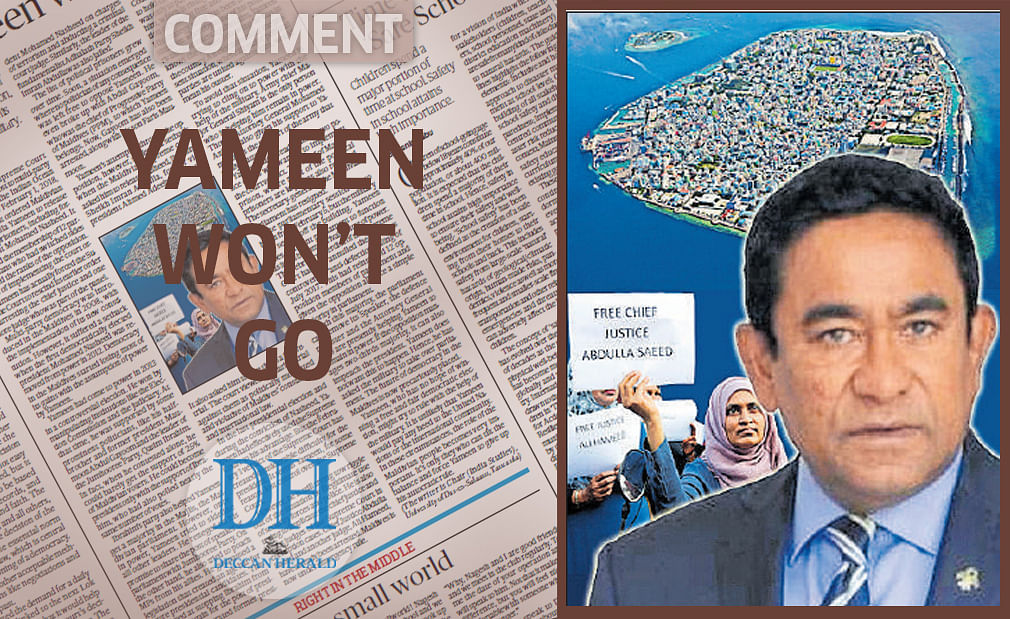
The Maldivian Supreme Court tried to give a boost to multi-party democracy in the Indian Ocean archipelago by its February 1, 2018, verdict whereby it ordered Maldivian President Abdulla Yameen to release nine political prisoners, including former president Mohamed Nasheed. It also restored the membership of 12 parliamentarians who had switched sides and joined the ranks of the opposition. Instead of implementing the court order, Yameen has actually forced the Supreme Court to rescind its earlier order by arresting the chief justice and one more judge who was part of the panel.
Multi-party democracy was introduced in the Maldives in 2008, with the implementation of its new constitution. However, it suffered a setback when the first democratically elected president Mohamed Nasheed was removed from power in 2012. Democracy in the Maldives started losing most of its gains with the assumption of power by Yameen.
Yameen had come to power in 2013 in a controversial election. He won by manipulating institutions like the Election Commission and the judiciary. At that time, he was supported by some prominent politicians, like his half-brother and former president Maumoon Abdul Gayoom and the leader of the Jumhooree Party, Qasim Ibrahim. In fact, when he contested alone, he could barely get the support of 25% of Maldivian voters. He could become president only with the support of Ibrahim, who had also polled nearly the same number of votes.
Ibrahim's party also helped Yameen get a majority in the Majlis, the Maldivian parliament. However, once in power, Yameen tried to sideline all other leaders. He reneged on his promise to share the post of speaker of parliament with Jumhooree Party. On the other hand, he also tried to poach MPs from his allies. He got passed a legislation that created an age bar for future presidential candidates. This was aimed at stopping Ibrahim from contesting again for the post of president. He incarcerated former president Mohamed Nasheed on charges of terrorism and abducting a criminal court judge. Similarly, the leader of the fundamentalist Adhalath Party Sheikh Imran Abdulla was also jailed.
The list of political prisoners grew over time. Soon, a situation emerged where no politician of any consequence was left free to oppose Yameen. He even broke up with Abdul Gayoom, who was the chief of Progressive Party of Maldives (PPM), to which Yameen belongs. Now, Gayoom has also been arrested, along with his son Faris Maumoon.
Yameen's attempt to throttle the opposition, however, suffered a setback when the Maldivian Supreme court asked him to release Nasheed, Ibrahim, Sheikh Imran Abdulla, former vice president Ahmed Adeeb and others. It also asked him to give them a fair re-trial. The court viewed the earlier trial against them as politically motivated and violative of Maldives' constitution and international law.
In the last presidential election and during the conviction of Nasheed, Yameen had effectively used the Supreme Court to his advantage. But the February 1 verdict of the Supreme Court has created considerable difficulty for the president. It seems Yameen, for some reason, lost control over the Supreme Court.
However, he is still trying to wriggle out of the situation by illegitimate use of security forces and police. He is also trying to implicate the chief justice and other judges of the Supreme Court in corruption cases. Chief Justice Abdulla Saeed and another judge, Ali Hameed, have already been arrested. Maldives is now under emergency rule.
In the aftermath of the Supreme Court verdict, Yameen said he is willing to hold early election, but it seems that was only to pacify public anger against him, which is rising. He has no intention of holding free and fair elections. His strategy so far has been to create a situation whereby none of his political rivals can contest against him. Yameen knows the limited following he has in the country. An election under the present situation, where all major political parties are united against him, would mean his ouster.
To avoid that situation, Yameen is trying to cling on to power with the help of the military. Army chief Major General Shiyam is the only person who is helping him remain in power. Though Attorney General Mohamed Anil has also given his support to Yameen, it's the support of the army that really matters.
Yameen has already sacked two police chiefs who wanted to implement the court verdict. The chief of Maafusi prison, where most of the political prisoners are kept, has also resigned. The secretary-general of the Maldivian parliament has resigned.
The parliamentary session was to begin from February 5, but the military has sealed off the building. Yameen does not want parliament to function as it will become a rival centre of power. The February 1 verdict of the Supreme Court had also annulled the previous controversial 'anti-defection' ruling of July 2017. This had reinstated 12 opposition members of parliament and given the opposition alliance a simple majority in parliament.
With this majority, the parliament can remove its Speaker, the defence minister and the Attorney General who are presently helping Yameen to remain in power. If the opposition manages two-thirds majority, it can also impeach the president. Yameen does not want this to happen. Hence, he has asked the military to take over parliament. The future of democracy in the Maldives is now precariously placed.
Yameen, who has no hope of winning a free and fair democratic election, might try to rule with the help of the military. It is unlikely that Yameen would pay any heed to the United Nations or the international community. In these circumstances, the role of the Maldivian people becomes very important. It's only they who can tilt the balance and force Yameen to give up his autocratic rule.
(The writer is Chair (India Studies), University of Dar-es-Salaam, Tanzania)